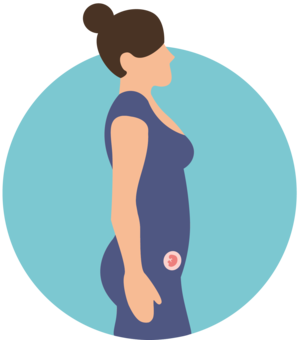Pregnancy at week 6
4-minute read
Your baby
This week your baby is growing very quickly – they will double in size to about 4mm long by the end of week 6.
By that time, the baby looks like a curved tadpole. It has a large head and a tail. Inside, the organs are starting to form. If you have an ultrasound in the sixth week, you may be able to see the baby’s heart beating.
The baby’s cells all have different jobs. They contain all the genetic information they needed to grow everything from the baby’s skin to their eyes to their liver.
Their jaw and eyes are starting to develop, as well as the ‘buds’ that will become arms and legs. Vertebrae are starting to form along their back. Also this week, a stalk which will develop into the umbilical cord attaches to the front of the baby’s body.
Your baby at 6 weeks
| Length: | 4mm |

Your body
If you didn’t realise you were pregnant last week, you will probably have noticed a missed period by now. You may also be feeling tired, your breasts may be tender, and you may be feeling nauseous or even vomiting.
Not all women experience morning sickness during pregnancy. It can happen at any time of day, not just in the morning, but it usually clears up by about 3 months into pregnancy. If you’re feeling very unwell or you have severe vomiting that doesn’t stop, talk to your doctor.
You might also notice your sense of smell is stronger and you might be having dizzy spells.
Things to remember
It’s a good idea to start your pregnancy care as soon as you realise you’re pregnant. See your doctor, who will confirm the pregnancy with a blood test, talk to you about your care options, and give you advice on how to look after yourself and your baby.
Make sure you tell your doctor if you are taking any medications. Now is the time to start eating healthily, which means eating all the nutrients you need for the baby and avoiding any foods that could harm them. It’s also important not to drink alcohol, smoke cigarettes or take illicit drugs while you’re pregnant since these can harm your baby.
If you’re feeling sick and tired, some gentle exercise may help you to feel better. Swimming or walking are good options. Keeping fit will help your body cope better with the demands of pregnancy.
Read next

Your pregnancy at 7 weeks
Learn about your pregnancy journey and what is happening to you and your baby.

Speak to a maternal child health nurse
Call Pregnancy, Birth and Baby to speak to a maternal child health nurse on 1800 882 436 or video call. Available 7am to midnight (AET), 7 days a week.
Learn more here about the development and quality assurance of healthdirect content.
Last reviewed: August 2020



